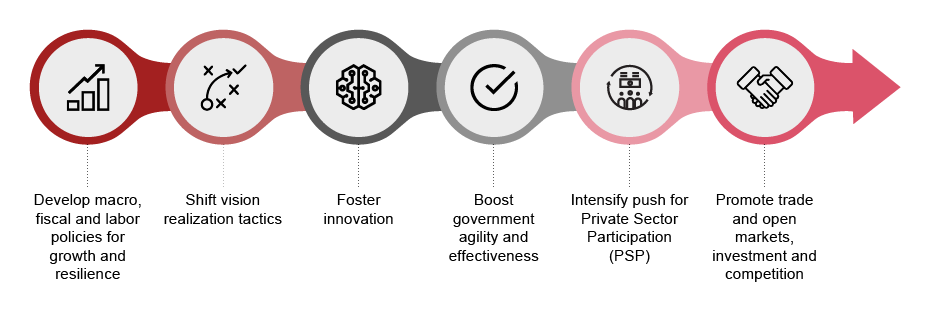{{item.title}}
{{item.text}}

{{item.text}}
GCC countries are experiencing a dual shock: the COVID-19 pandemic and lower oil prices. The pandemic is having tragic human consequences. The necessary containment measures are having detrimental effects on the global economy and world trade, with serious consequences for the import-dependent GCC countries. The result is supply-side issues and disruptions to global value chains that are creating production problems in GCC economies. Patterns of demand are changing, with demand overall shrinking. Production and productivity are dropping.
Along with the impact of the pandemic, GCC countries are contending with a fall in oil prices to their lowest levels in 17 years. GCC state revenues are oil-dependent. If the oil price remains at around $20 per barrel for the rest of the year, GCC governments could lose $554 million a day.
This dual shock has hit all parts of the economy and all elements of the economic cycle. The economic system as a whole is at risk the longer these shocks endure.
The outlook is discouraging. The spread of COVID-19 is likely to keep oil prices low, and reduce global demand for oil. Within the GCC, the necessary containment measures and prudent restrictions are having a serious effect on other economic sectors. In recent years, GCC countries have made considerable efforts to develop travel and tourism. However, Saudi Arabia has now been forced to suspend travel for the Umrah (a pilgrimage that can be done at any time of the year), which attracted some 7.5 million visitors in 20192. Continued travel restrictions could affect the ability to perform the Hajj (the major pilgrimage that must be performed at the end of the Islamic calendar), which brought in around 2.5 million visitors in 20193. Meanwhile, Dubai’s tourism season is experiencing a decline reminiscent of the 2008 crisis.
GCC leaders must act quickly. Their aim should be to contain and minimize the disruption from the dual shock and mitigate the risks, while building capabilities for the eventual recovery and adapting their tactics for economic transformation and sustainable growth.
GCC governments need to take three sets of actions:
GCC governments are already taking a range of measures to confront the immediate healthcare aspects of the pandemic and to treat those affected by COVID-19. GCC governments must continue to monitor the global and regional spread of the pandemic and constantly review leading practices. They will need to increase the focus on testing and healthcare capacity expansion, which means securing critical supply chain components including ventilators. In addition to causing individual physical suffering, the virus sows chaos in communities by causing a surge in cases that overwhelms the healthcare system, particularly intensive care unit (ICU) capacity, with drastic knock-on effects for others seeking treatment.
All GCC governments have already allocated substantial sums in stimulus packages ranging from around 2 percent to 30 percent of GDP. As elsewhere, there is a rising tempo of measures as governments seek to protect citizens and support private businesses, indicating that more support is on the way. For example, the UAE first announced an AED1.5 billion ($409 million) package on March 12, 2020, followed with AED100 billion ($27 billion) on March 14, 2020, and AED16 billion ($4.3 billion) on March 22, 2020. Such steps are a recognition by governments that the economy may need multiple rounds of stimulus packages in the coming months, possibly even into next year.
There are three main targets for support: the population, businesses, and financial institutions.
In terms of the population, GCC governments need to strengthen social safety nets, enhance consumer protection, and pay special attention to vulnerable groups. GCC governments have already taken such measures as temporary exemptions and delays of fees and loan repayment. They have secured the salaries of private-sector workers for the next few months and granted extensions for residency renewals. Governments have taken important consumer protection initiatives such as through public campaigns about consumer rights and banning profiteering for products that are in high demand.
To supplement these actions, GCC governments should focus on vulnerable groups. For example, GCC governments could adopt the approach of some European countries and offer exceptional paid sick leave and extended medical insurance for those sick and quarantined. They can offer direct cash support to low-income residents facing unemployment.
In terms of businesses, GCC governments need to extend immediate assistance to the seven worst-affected sectors. These are air transport, hospitality and entertainment, banking and finance, construction and real estate, manufacturing of non-food items, retail, and petrochemicals. COVID-19 and the drop in the price of oil has led to significant demand-side and supply-side shocks, which will mean that such sectors as petrochemicals will have to endure large and prolonged economic disruption.
All support measures must be consistent with long-term economic priorities. GCC governments can achieve this by attaching conditions that secure employment and social protection, lead to higher output, prepare for economic recovery, and promote long-established goals of innovation and resilience. Assistance packages should avoid unproductive subsidies that have limited impact on GDP or employment; that help uncompetitive sectors and traditional business models, such as those likely to be replaced in the near future; or that will be difficult to reverse.
Support to businesses should be tailored and channeled in a flexible and agile manner. For example, governments can streamline procurement to accelerate the mobilization of demand and resources that will help businesses. They can help businesses through the uncertain climate by providing them with business advisory services. Governments can also ensure that existing development funds and authorities change their processes to respond with assistance based on “business recovery plans” submitted by medium-sized and large businesses.
The demand for “business recovery plans” is critical if GCC governments are to maximize value for money and maintain momentum toward broader national development goals. There should be a checklist that asks about the type and degree of government support required; how the support will be used; the action plan the business will pursue for its main line of activity or service; planned recovery measures; and details of any other form of non-financial support that may be required.
In terms of financial institutions, swift and decisive action is vital to prevent a deepening of economic problems. Measures should allow the financial sector to fulfil its role as a financial intermediary for the real economy in a timely manner. GCC governments have already introduced measures to cut costs on banks, increase the liquidity of financial institutions, support capital markets, and relax restrictions on lending. It is essential to accompany these measures with significant awareness campaigns so that the population and businesses understand that they can have confidence in the financial system, which will have a positive economic influence.
GCC governments need to prepare for a sustainable recovery. The health emergency will eventually subside. GCC governments therefore need to ensure that their crisis response lays the groundwork for a sustainable recovery that promotes economic diversification and transformation. Governments should be rescuing today’s economy with the goal of building the economy of the future, not restoring the economy of the past. Their strategic efforts should focus on the well-being of the population, through an institutionalized recovery process, capabilities building, and improved communications.
GCC governments will need to move ahead in six areas.
The COVID-19 pandemic is at its essence a human crisis. Although governments around the world are crafting detailed economic, health, and technical initiatives, they must remember to center their responses on their populations. For GCC governments, this means that they should take action in six areas related to national priorities, expenditures and investments, capabilities, and constituent engagement.
The dual shock of the COVID-19 pandemic and lower oil prices will eventually end. By taking decisive steps now, GCC governments can prepare for the recovery and keep their long-term economic development on track. They can lay the groundwork for a sustainable economic recovery powered by diversification and innovation.
{{item.text}}

{{item.text}}





















Menu